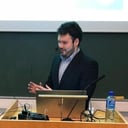The Big Jump
I’ve been working as an iOS developer for the last 8 or so years. When I first moved to Israel back in 2008, I intended to spend a few months learning Hebrew and return to the US to continue working as a spiritual mentor applying the ancient wisdom of Kabbalah.
Seems like a big jump, right? Spirituality to Code? Well, as it turns out, they’re not as far apart as you might think. What I learned and continue to learn through Kabbalah, applies in every single way to my work as a developer. How so, you ask? Well, first, let’s talk a little bit about consciousness.
Consciousness? What's that?

There are many discussions on the topic of consciousness, what it is, where it came from, and how it plays a role in our lives, or more accurately, how it is our lives.
Kabbalah is a wisdom that speaks on consciousness, the source of consciousness, our purpose in life, and how to connect to consciousness. I won’t get into the debate on whether Kabbalah is a religion or not, or its connection with Judaism, as that would simply be irrelevant to the scope of this post. The idea here is to open you up to the possibility that there is something beyond your logical, intellectual mind, something deeper.
In simple terms, Consciousness is the thought behind the action. It’s the question of why are you doing what you’re doing. For example, let’s say your friend is thirsty, and you offer him a glass of water. Even though the action is a simple one of pouring water into a glass, and handing that glass of water to your friend, your thoughts can be either those of your friend’s best interest or those of your interests alone.
What does that mean practically? Thinking only of myself means I’m only concerned about what I can get out of giving my friend the glass of water, whether it be their affection, their approval, removing previous guilt, overall — selfishly expecting something back in return, in other words, a personal agenda. Thinking only of my friend means helping my friend is my first and foremost concern.
Taking this idea further - when we have a desire, what is it we truly desire, and for how long do we want to be fulfilled by this desire? 1 minute? 1 hour? 1 year? Endlessly? The consciousness behind our actions equates to our innermost desires, and there is a very simple formula for determining how long you will feel good from fulfilling a desire: Selfish desires = small desires = less fulfillment. Desires that involve sharing = bigger desires = more fulfillment.
When you resist the urge to fulfill your small desires, you immediately open up the door for deeper, more impactful desires. For example, let's look at complaining. What is complaining? Think about it ... what is your desire at the exact moment you are complaining? Your desire is validation, to be "right", to be "seen", or to be higher than others through judgment. The last time you complained, how long did you feel good before needing to complain again? I'll bet not long ...
If at the moment you feel like complaining, you were to instead resist this urge, you would see that quite quickly different thoughts would begin entering your brain, such as - "how can I take responsibility in this situation?" or "how can I improve this situation by adding some value?". These questions point to bigger desires, as we mentioned before, desires that influence others outside yourself, and as a result, allow you to simply feel good for longer periods of time.
The tricky part is identifying these selfish desires in real-time, as well as understanding that our desires are the root of even the most basic, seemingly unimportant events in our life - including writing a simple line of code.
How many times have you missed a comma, or misspelled a word that resulted in a crash, a bug, or a miscommunication with a fellow team member? And out of all those times, I would venture to say your consciousness, and your desires at that moment in time were more than likely on the selfish side of the scale - either you were upset about something, not caring about what you were doing, or thinking about your next meal.
Bringing Consciousness to Code
Ok, back to code. Now that we’ve started to paint an initial picture of what consciousness is, we can begin to develop an awareness that everything around us is just a reflection of our consciousness — in that every action we do starts with a thought, and behind each thought is an intention — either to satisfy my selfish desires or to impart to another.
Coding for me is an opportunity to practice consciousness — more so to bring more consciousness into my own life. Conscious coding means understanding that the thoughts behind my code have an impact on the result of that code, and ultimately on my experience at my work, my emotions, and my overall level of happiness.
So if you’ve ever heard that oh-so-familiar voice “oh, I’ll test that later”, or “I don’t need to comment on that piece of code, no one will notice”, or “I’ll show everybody how great I am! Check my awesome code out!”, then most likely you’re thinking only about yourself and your agenda, and the ultimate result will have to be a reflection of that thought— meaning some sort of difficulty or challenge showing itself down the line as the effect to that causal consciousness.
However, if your thought is “How will this code affect the product as a whole?”, and “Is my code understandable and beneficial to future developers?”, and “How can I make my code better so that the whole company can benefit?”, then the ultimate result will also have to be a reflection of that thought — meaning some sort of continuity, synchronicity, and even what you might call a “miracle” down the line as the effect to that causal consciousness.
It’s a daily effort and investment to put higher, caring consciousness into what you do while resisting the urge to think selfishly, but ultimately the benefit is worth the investment, and in the end, you are the one that receives the payoff.
It must sound simple, right? Change my consciousness, change my reality? Well, guess what? It is.







